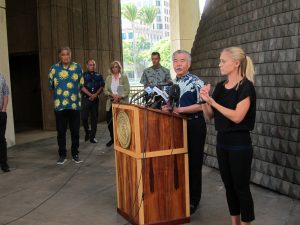Governor orders quarantine for arrivals, state shutdown
Posted on Mar 28, 2020 in Capitol Connection, Featured“The next few weeks are critical in this fight against COVID-19. The stay-at-home, work-from-home order is so important. It’s about all of us being respectful of each other. Working together, we will beat COVID-19.”
– Governor David Y. Ige
A few months ago, who would have thought a strange, new virus would spread across the globe, sicken thousands of people, and affect every aspect of our daily lives. To protect Hawai‘i against COVID-19, the state, counties and a broad range of community partners have launched an all-out public health campaign to slow the spread of the disease. This edition describes some of the most recent developments in this rapidly changing environment and provides advice on how we can keep each other safe.
Q. What is the state doing to protect the community? How can people help?
A. We’re tackling the problem on every level: mandating a first-in-the-nation, 14-day self-quarantine for both residents and visitors, arriving or returning to Hawai‘i, as well as those traveling inter-island; a statewide ’stay-at home’ order through April 30 (except for essential services); closing facilities; and coordinating with healthcare providers to make sure they have the resources they need. We need to take care of our people and communities first. Our directives also include limiting gatherings to groups of 10 or less, closing bars and clubs, and providing drive-thrus and take-outs at restaurants. These actions are extreme, but they will help flatten the curve and lay the groundwork for a quicker recovery. We need to come together as a community to fight this virus.
The best thing people can do to slow the spread is to maintain social distance. We want people to be smart about taking care of themselves and others — especially our seniors. That means avoiding crowds, staying home if you’re sick and washing hands often. So far, it appears that about 80 percent of people experience mild to moderate symptoms from the virus, but reports show that senior citizens are much more vulnerable and even young people may spread the disease without realizing it. It should be noted that nearly all of the cases that have tested positive have been travel-related. The majority are Hawai‘i residents who were infected somewhere else and returned to the islands. We’re also carefully monitoring “community spread.”
Q. If people have flu-like symptoms, what should they do?
A. The first thing to do is to self-isolate and call their doctor or the nearest healthcare provider, who can make recommendations for care and determine if COVID-19 testing is needed. To keep our resources from being overwhelmed, the state Health department is reminding everyone that the tests are intended for those experiencing more serious symptoms. The public can go to the new DOH website at HawaiiCovid19.com for the latest information and advice.
Q. How can the Department of Health’s statewide community surveillance testing program help us?
A. This “sentinel surveillance” is an important tool to help detect if COVID-19 is circulating in our community. We’re testing samples statewide from people who tested negative for the flu to see if they test positive for COVID-19. This surveillance will help us identify cases of “community spread” of the virus so we know where we need to take steps to contain it. Hawai‘i is one of the first states to use this, and, so far, indications are the spread has been limited.
Q. What are your concerns about the effect of COVID-19 on the state’s economy and people’s jobs?
A. We know our state economy is going to take a hit, but our first priority is saving lives. The second is economic stability. We have taken steps to help our local businesses and employees who are being laid off. This includes a loan program for small businesses, systems to make it easier for people filing unemployment claims, and an initiative to connect the unemployed with sectors hiring employees to combat COVID-19. The economists and industry officials I’ve talked with are confident Hawai‘i will rebound.
